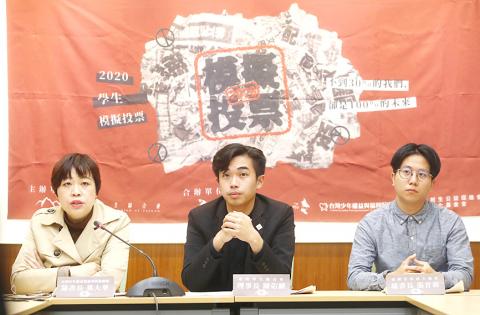More than 80 percent of students who took part in online mock elections ahead of the Jan. 11 polls voted for President Tsai Ing-wen (蔡英文) as the next president, the National Students’ Union of Taiwan said yesterday.
The mock elections were jointly organized by groups including the Taiwan Youth Association for Democracy and the Taiwan Alliance for Advancement of Youth Rights and Welfare, as well as 35 university student unions, the union said.
Voting took place on Facebook from 8:20pm on Thursday last week to 8:20pm on Sunday, the groups said, adding that holders of student identification cards from senior high schools, vocational high schools and universities in Taiwan were allowed to vote for one presidential candidate and one political party.

Photo: CNA
A total of 11,369 valid votes were cast in the mock elections, union president Tan Ko-him (陳佑維) said, adding that invalid votes, such as those cast by non-students, were not counted.
University students accounted for 8,594 votes, while senior-high and vocational-high students accounted for 2,775, he said.
Tsai, of the Democratic Progressive Party (DPP), won the mock presidential election with 85.5 percent of the vote, he added.
People First Party (PFP) Chairman James Soong (宋楚瑜) finished second with 9.8 percent and Kaohsiung Mayor Han Kuo-yu (韓國瑜), the Chinese Nationalist Party’s (KMT) presidential candidate, garnered 4.7 percent of the vote for third place, Tan said.
Four political parties — the New Power Party (NPP), the DPP, the Taiwan Statebuilding Party and the Taiwan People’s Party (TPP) — secured at least 5 percent of the party vote, he said.
The NPP received 26.86 percent of the party votes, followed by the DPP at 25.78 percent, the Taiwan Statebuilding Party at 24.21 percent and the TPP at 11.87 percent, he said.
Legislator-at-large seats are to be divided among the parties that pass the threshold in the Jan. 11 legislative election.
With 454 votes, the Green Party Taiwan crossed the 3 percent threshold that would be required for a party to qualify for government subsidies, Tan said.
The KMT fell short of the 3 percent threshold with 341 votes, but reached the 2 percent threshold that would allow it to nominate legislator-at-large candidates in the next three legislative elections, the results showed.
The PFP received 1.81 percent of the votes, while the other 12 parties that were also included in the mock election each garnered less than 1 percent of the votes, Tan said.

Taiwanese can file complaints with the Tourism Administration to report travel agencies if their activities caused termination of a person’s citizenship, Mainland Affairs Council Minister Chiu Chui-cheng (邱垂正) said yesterday, after a podcaster highlighted a case in which a person’s citizenship was canceled for receiving a single-use Chinese passport to enter Russia. The council is aware of incidents in which people who signed up through Chinese travel agencies for tours of Russia were told they could obtain Russian visas and fast-track border clearance, Chiu told reporters on the sidelines of an event in Taipei. However, the travel agencies actually applied

Japanese footwear brand Onitsuka Tiger today issued a public apology and said it has suspended an employee amid allegations that the staff member discriminated against a Vietnamese customer at its Taipei 101 store. Posting on the social media platform Threads yesterday, a user said that an employee at the store said that “those shoes are very expensive” when her friend, who is a migrant worker from Vietnam, asked for assistance. The employee then ignored her until she asked again, to which she replied: "We don't have a size 37." The post had amassed nearly 26,000 likes and 916 comments as of this

New measures aimed at making Taiwan more attractive to foreign professionals came into effect this month, the National Development Council said yesterday. Among the changes, international students at Taiwanese universities would be able to work in Taiwan without a work permit in the two years after they graduate, explainer materials provided by the council said. In addition, foreign nationals who graduated from one of the world’s top 200 universities within the past five years can also apply for a two-year open work permit. Previously, those graduates would have needed to apply for a work permit using point-based criteria or have a Taiwanese company

The Shilin District Prosecutors’ Office yesterday indicted two Taiwanese and issued a wanted notice for Pete Liu (劉作虎), founder of Shenzhen-based smartphone manufacturer OnePlus Technology Co (萬普拉斯科技), for allegedly contravening the Act Governing Relations Between the People of the Taiwan Area and the Mainland Area (臺灣地區與大陸地區人民關係條例) by poaching 70 engineers in Taiwan. Liu allegedly traveled to Taiwan at the end of 2014 and met with a Taiwanese man surnamed Lin (林) to discuss establishing a mobile software research and development (R&D) team in Taiwan, prosecutors said. Without approval from the government, Lin, following Liu’s instructions, recruited more than 70 software